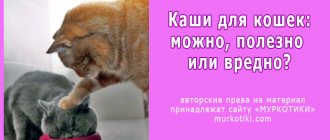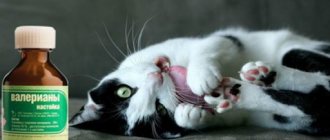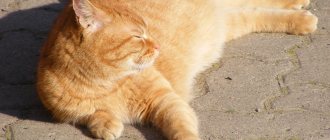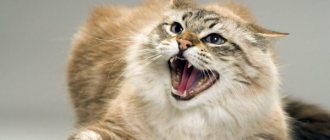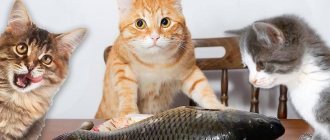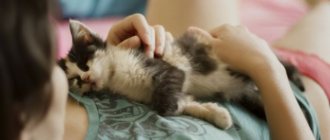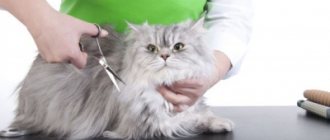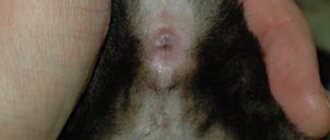≡ Home → Valerian → About valerian →
Cats are very sensitive to the aroma of valerian. All they need to do is sniff a plant or drug a little for their behavior to immediately change. The cats begin to feel euphoric, they try to lick the product, rub against it, but at the same time they have little control over themselves and drool. After this, many cats become more affectionate and gentle, others, on the contrary, become aggressive and restless. When the period of hyperactivity ends, the animals fall asleep for a long time.
Cats are drawn to valerian in all forms - dried roots, extract tablets and even tincture
Some owners use the cats' partiality for valerian to accustom the cat to a tray or scratching post, to lure it somewhere or lure it out from somewhere. However, you can decide how justified and safe it is for the animal only by understanding how valerian affects the health and well-being of the cat.
Why cats like valerian
Cats and cats love the smell of valerian. They are most attracted to dry rhizomes or fresh grass. A decoction or tincture may also interest your pet, but animals may not approach the poured drops of valerian for a long time, waiting for the alcohol to dissipate. Cats are indifferent to pills, since they have virtually no smell. In addition, it is worth considering that the tincture and tablets contain a large dose of the drug and additional components, which is why they can be dangerous to the health of the animal if the cat swallows the drug.
Even when mixed with other plant materials, the smell of valerian is very well recognized by animals.
Valerian essential oil contains more than 100 different biological substances. At the same time, only one thing provides a specific reaction of cats to the plant - actinidin. It is this scent that attracts animals. While studying why cats love valerian, scientists found that the smell of actinidin is very similar to the smell of another substance, feline, which is found in cat urine.
It is because of this component that the smell of cat marks lasts so long. Felinin has a very pungent and persistent aroma and, in natural conditions, helps cats mark their territory and scare away foreign males, as well as look for a mate. Felinin is perceived by cats as a pheromone and causes strong sexual arousal in them.
Since the smells of feline and actinidin are very similar, valerian attracts cats so much. Having smelled the aroma, they immediately run to its source and begin to sniff, lick or chew the object from which the smell comes. As a result of the effect of the substance on the nervous system of animals, they produce certain hormones and develop strong arousal.
Valerian does not work on all cats. No more than 70% of pets are sensitive to its smell. Most of all, the plant attracts males of reproductive age and females during estrus. Kittens under one year old are practically indifferent to valerian, since they have not yet fully developed the mechanisms responsible for sexual arousal. But valerian has a full effect on castrated cats.
On a note
It is believed that Siamese cats are the least sensitive to the smell of valerian.
It is noteworthy that the smell of valerian attracts not only cats, but also their larger brothers living in the wild. However, the plant has a much smaller effect on them, which is explained primarily by the size of the animals and the amount of valerian they can eat. In nature, animals can only find a valerian bush and chew its leaves a little or gnaw on the root. However, they will not eat enough of the plant for it to have the same strong effect on them as it does on domestic cats.
Description of medicinal valerian
As long as humanity has existed, it has known about the medicinal properties of valerian. The roots of this plant, which were used by healers of ancient Greece, Rome, Egypt, India, and the Ancient East, are especially valued.
Valerian is the scientific name of the plant and is popularly called cat grass, cat root or mount grass. This is explained simply: its smell is very attractive to cats and has a special effect on them. It belongs to the family of perennial herbs and loves to grow in lowlands, near ponds, and in wetlands.
Visually it looks like this:
- Not only does it have a tall stem, which can reach 2 meters in height, but it is also very thick.
- The flowers are pinkish in color and are collected in an umbrella.
- The root system is loose, short, with many branches.
As soon as cats smell the smell of this plant, they immediately gather near it and begin to roll around in order to damage the integrity of the stem. Then they begin to lick the juice released on the surface of the stem.
Under the influence of the juice, they begin to roll on the ground even more, jump and scream loudly. Valerian has a stimulating effect on them, although people take this remedy, on the contrary, to calm them down.
Is it possible to give cats medications based on this herb?
Valerian, like any medicine, can be dangerous to a cat’s health, so it is not recommended to give it without a veterinarian’s prescription. In veterinary medicine, the drug is also used rarely and in very small doses.
Valerian is prescribed to cats for:
- Diseases of the digestive tract;
- Diseases of the nervous system;
- Diseases of the endocrine system;
- As a general tonic and appetite stimulant if the cat is lethargic and does not want to eat.
The sedative or hypnotic effects that valerian has on humans do not appear in cats. In them, the drug, on the contrary, causes nervous excitement.
In rare cases, when veterinarians prescribe valerian to a cat, they recommend giving the animal only natural preparations. This is a decoction or infusion of valerian rhizomes and roots, or the raw material itself in dry form. In this case, you must strictly follow the specialist’s recommendations regarding dosage.
On a note
In veterinary medicine, preparations based on Schisandra chinensis root are used as a tonic and stimulant. Special medicines are prepared from it for cats, the use of which is much safer than the use of valerian.
An overdose of valerian for cats is very dangerous. In this case, severe poisoning, disruption of internal organs and death can occur. If for a person 1-2 tablets or 30 drops of tincture are a normal single dose of the drug, then for a cat such an amount can be extremely dangerous. This is due not only to the high concentration of active substances, but also to the fact that drugs intended for humans have a completely different effect on animals.
It is also useful to read: Overdose of valerian and the amounts that can kill a person
It is generally not recommended to give valerian extract in tablets to cats. They contain a large dose of the active substance, which is only 25% of the mass of the drug, while the remaining 75% is occupied by additional components. Chemicals are very dangerous for cats. They can cause intoxication and a severe allergic reaction.
It is also not recommended to give cats tincture. It contains 70% ethyl alcohol, and any alcohol is toxic for cats. Their body does not absorb it, so even one-time use can cause liver and kidney damage.
In rare cases, when there is really a need for this, the cat can be given a sniff of valerian root or given 2-3 drops of infusion to drink. In this case, you need to take into account all the possible risks associated with this.
If a cat eats a lot of valerian, it may become poisoned.
Valerian is completely contraindicated for kittens, pregnant cats and animals with liver and kidney diseases.
Valerian tablets
Some owners wonder whether it is less harmful if they give their cat a valerian tablet. The very topic of giving or not giving valerian to a cat should be understood as far as it is reasonable. Of course, tablets are less harmful due to the fact that they contain less plants than drops. But excipients that have a synthetic base can cause allergic reactions in the cat.
Drops of valerian can turn a cat into an addict, even an alcoholic. The plant is infused with alcohol, and it can cause irreparable harm to the cat’s body.
After temporary excitation, the animal may enter a stage of inhibition. If after taking the medication, especially valerian tablets, your cat falls asleep soundly and for a long time, immediately show him to the veterinarian.
How does valerian affect cats?
Valerian has a stimulating effect on cats and cats, and they do not exhibit a sedative or hypnotic effect at all. Under the influence of the smell of rhizomes or grass, cats produce certain hormones that stimulate strong sexual arousal. In this case, valerian acts on animals as a powerful aphrodisiac.
After smelling valerian, some cats become very affectionate, asking to be held by their owner, wanting to be stroked. Others begin to meow loudly, calling for a partner, and try to escape from home. In some cases, cats become so excited that they behave aggressively. They can run around the apartment, hiss, scratch, tear off wallpaper and turn things over.
When valerian is used internally, if the cat drinks the infusion or eats the herb, it has a stronger effect on the animal. Valerian affects the central nervous system, triggering excitation processes, and also stimulates the production of a number of hormones. Under the influence of the drug, the load on all internal organs of the animal increases, including the vestibular apparatus. It is because of this that it becomes difficult for the cat to walk, and he begins to stagger from side to side. Alcohol intoxication can also occur if the cat is given even a small amount of alcohol tincture to drink.
The effect of valerian on cats appears almost immediately. The period of hyperactivity usually lasts from 20 minutes to half an hour. After this, the processes of excitation in the central nervous system fade away and inhibition occurs. Cats calm down and fall asleep for many hours, completely unresponsive to what is happening around them. As a result of such unnaturally powerful jumps in the processes of excitation and inhibition in cats, neurons in the brain suffer.
Exciting effect
So is it possible to give a cat valerian to calm it down? As we can judge from the above material, valerian acts on cats not as a sedative, but, on the contrary, as an exciting aphrodisiac that excites them. Also, many owners mistakenly believe that a non-concentrated mint solution can calm a nervous cat.
But that's not true. Mint, even in small quantities, can have similar effects on cats as valerian root. It follows from this that in order to calm your pet, it is advisable to use other drugs, after consulting with a veterinarian first.
Is it possible to calm a cat with valerian?
Valerian does not calm cats, but excites them. The long sleep that follows is only the result of a natural change in the processes of excitation and inhibition in the central nervous system. Deep sleep is the cat’s body’s reaction to stress and depletion of internal resources caused by the effects of the drug.
If you give a cat valerian to calm it down, in the first half hour its reaction will be the opposite of the desired one - the animal will first “go crazy”, and only then calm down and fall asleep.
If you need to calm your cat down or euthanize him before a long journey, you can buy special products at a veterinary pharmacy. There are many herbal preparations for animals that are practically safe for them. Some remedies also add very small doses of valerian, which in combination with other medicinal substances can contribute to a sedative effect.
It is not recommended to give an animal any drug before vaccination to calm it down without a veterinarian's prescription. Medicinal components may interact, which can be dangerous to the cat’s health.
On a note
To calm cats, motherwort-based preparations are sometimes used. However, you can only give cats special products purchased at a veterinary pharmacy or pet supply store. Since motherwort does not provide a quick effect, veterinarians advise giving it to cats 4-5 days before the expected stressful situation.
Will the product help calm a cat during heat, or keep a roaming cat at home?
Sometimes, with the help of valerian, owners try to calm a cat during heat. As already mentioned, it does not have a sedative effect on animals, however, even in these cases it is sometimes effective. Since the aroma of valerian rhizomes resembles the smell of a substance contained in the urine of cats and is perceived by them as a pheromone, the cat can calm down a little thanks to the illusion that there is a cat nearby.
You can only give the cat a sniff of the dry rhizome or its decoction. You should not give your cat valerian. In this case, it will only have an exciting effect. When letting your pet smell the drug, you also need to take into account that it may not calm her down. Some cats, on the contrary, may become even more excited and begin to meow incessantly, calling for the cat. It is best to replace valerian with special sedatives for cats.
Since valerian does not have any long-term effect, it cannot be used to keep an animal at home.
As for cats, trying to wean them from hanging out with the help of valerian is practically useless. If you drop a couple of drops of tincture somewhere, the animal will most likely sniff the object and stay near it for a long time. The very next day, without such a stimulus, the cat may run away again. You can’t give him valerian all the time, as the cat can get used to it and then constantly ask for it. It can also have a bad effect on his well-being and behavior.
It is also useful to read: Is it possible to drink valerian during pregnancy?
Is it possible to accustom a cat to a litter box or scratching post using valerian?
Sometimes, with the help of valerian, they try to accustom a kitten to a tray or scratching post, and this quite often turns out to be ineffective. About 30% of cats are not sensitive to the smell of valerian. Kittens under the age of 12 months react least to it, and it is advisable to accustom animals to something at a young age.
Older cats can be attracted to the scratching post with valerian. To do this, just drop a few drops of decoction or infusion of rhizomes on it. You can also use tincture. In this case, you can first pour it into some container and leave it for a while so that the alcohol disappears.
The alcohol in valerian tincture is even more harmful to the cat, and therefore, whenever this product is used, the alcohol must be removed.
The liquid drug should be applied to the scratching post in a very small dose. Do not forget that the smell of valerian has a stimulating effect on cats, and this is not at all beneficial for them. It is also believed that valerian can be addictive in cats even after just one use. Wanting to feel the aroma of the plant again, the cat may constantly return to the scratching post, while he may also begin to meow more, demanding medicine, and become more aggressive.
It’s also not worth using valerian to lure a cat into a carrier. Before traveling, you need your pet to be completely calm. Valerian, on the contrary, will put him into a state of excitement.
What is special about the plant and its attractiveness to cats?
Valerian officinalis is a perennial herb with thick stems and umbellate inflorescences. All its parts contain a large amount of bioflavonoids and essential oils. The massive rhizome is used in medicine and herbal medicine. It is rich in glycosides, bioactive acids, amines and enzymes.
In humans, valerian extract or infusion acts as a sedative. It is taken as part of complex therapy for cardiovascular diseases, pathologies of the nervous system, for sleep disorders and in a state of increased stress.
Valerian has the opposite effect on cats. The animal becomes excited, the pupils of the eyes dilate, and the heartbeat quickens. After licking the tincture or chewing a little dry plant, pets experience strong euphoria, they spin around the floor and show genuine pleasure.
However, teenage kittens, older cats, and those who have been doped too much may suffer from hallucinations, panic attacks, and uncontrollable aggression.
In fact, valerian acts like a drug on cats. They react to small doses in characteristic three stages:
- agitation and excessive activity;
- inhibition and sleep;
- withdrawal symptoms accompanied by lethargy.
Animals experiencing pain due to chronic diseases or intestinal spasms due to digestive disorders receive relief. In addition, active neurostimulants in valerian can awaken the sexual instinct, because their smell is similar to cat pheromones. This also explains the fact that males are more sensitive to the effects of the plant than females.
If a pet receives it systematically, it develops a habit. The reason for this is the substance – actinidin, which is a powerful stimulator of the receptors of the pleasure center in the cat’s brain. He will increasingly demand a new dose and increase the amount. The periods of excitement will be shorter and shorter, and sleep and withdrawal symptoms will be more difficult and painful. The owners, indulging the pet's desires, turn him into a drug addict. The once cheerful and well-groomed animal loses interest in games, communication, food, and looks unkempt and sick.
Well-mannered and affectionate animals behave inappropriately, attack their owners, damage furniture, and relieve themselves wherever they want.
Exceeding the dosage and abuse will inevitably lead to severe coma and death of the cat. There is no single lethal dose of valerian. Each animal has its own threshold of susceptibility; some can suffer a massive stroke, heart attack or respiratory arrest and die from just three tablets.
Why are different valerian preparations dangerous for cats?
It is not recommended to give valerian to cats without the advice of a veterinarian and the presence of indications, because it can cause harm to their health. A high dosage of the drug can poison and even kill the cat. It is unknown what dose of valerian can be fatal for a cat. It all depends on the individual reaction of the animal both to valerian itself and to the additional components contained in pharmaceutical preparations.
It is very undesirable to give cats valerian drops, as they can poison the cat. The tincture contains alcohol, which is not absorbed by the cat's body. Any alcohol, even in a small dose, can cause toxic damage to the liver and kidneys and intoxication of the entire body in animals. Alcohol can also burn the mucous membranes of the cat’s mouth and larynx, which will be very painful for him.
The most dangerous for cats are valerian tablets and alcohol tincture. Even one tablet can cause an overdose of the drug, and the excipients can cause poisoning and allergies.
Symptoms of an overdose of valerian in cats are:
- Impaired coordination of movements, when the cat cannot walk straight, but staggers from side to side;
- Convulsions;
- Discharge of saliva and foam from the mouth;
- Vomit;
- Loss of consciousness,
- Apathy and falling asleep 5-10 minutes after taking the drug.
Loss of motor coordination in cats, when they stagger, fall and move sideways, may seem funny. Not knowing that this condition is very difficult for the animal and is the result of an overdose of the drug, sometimes owners pour valerian into the cat’s mouth to supposedly entertain it.
A typical example of animal abuse.
If any symptoms of an overdose of valerian appear, the cat should be urgently taken to a veterinary clinic to receive help. The most dangerous symptom is an unexpected dream. If a cat falls asleep literally immediately after taking valerian, there is a risk that it may die.
On a note
To treat poisoning in cats, water diluted with apple cider vinegar is sometimes used. However, this remedy only helps with alkali poisoning; with an overdose of valerian, it is completely ineffective.
The effect of valerian in small doses on a cat is also not beneficial. The drug causes a sharp and strong excitation of the central nervous system, which is replaced by inhibition processes. Since the stimuli are very strong and such vibrations are not natural for the animal, it can destroy neurons in the brain.
It is also believed that valerian can cause visual hallucinations in cats. Although there is no scientific evidence for this, according to experts, it is precisely their consequence that cats behave wildly, when they begin to hiss and rush at something in an empty space.
Sometimes cats, once they try valerian, begin to look for it and beg for it, constantly meowing. It is believed that the plant can be highly addictive, and it is then very difficult to wean a cat off valerian. If such a problem arises, only a veterinarian can help solve it. Of course, not all cats get used to it. Some animals can safely tolerate one dose of the drug, while it can cause serious harm to the health of others.
Interesting video: cat's reaction to valerian tablets
Valerian medicinal
But cats do not always need valerian as a drug. Having the ability to relieve spasms of the gastrointestinal tract, it attracts representatives of all cat families as a medicine. The medicinal properties of medicinal valerian root are also used in veterinary medicine. An aqueous infusion of valerian in small doses, selected by a veterinarian, is used to treat:
- Heart failure
- Gastrointestinal tract
- Nervous system
All domestic cats and wild representatives of the cat breed are attracted by the aroma of valerian. But if there is no access to synthetic tablets or tinctures in the wild, then domestic cats are at risk. Especially if the “kind” owners occasionally treat them to a tablet or pour a few drops of tincture . Before giving your cat valerian, you need to think about whether you need a drug-addicted cat in the house, ready to beg and get the drops he needs so much by any means possible.

